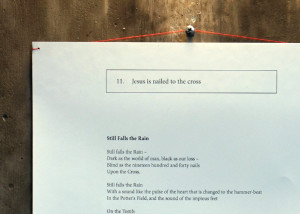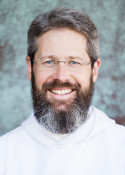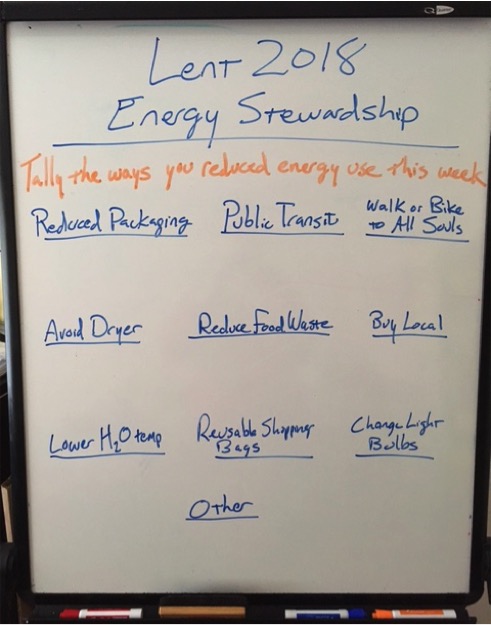FROM THE RECTOR
Practice Makes
We practice all the time. Sometimes, even on purpose. Whenever we are attempting to gain a new skill we practice the components until the action, approach, or stance becomes ingrained. Over time, with patience and perseverance, intent becomes habit.
Musicians do this not only by practicing a piece of music, but also by practicing scales. Perfected scales are not the end product, but a means to gain fluidity, so that your body knows what to do without having to think it through. Through dedicated practice, notes and their relationship to one another, become part of your being.
Similarly, athletes spend hours practicing a single move, whether it’s a forehand volley, or a crossover dribble. Again, the intent is not that this particular skill will be an isolated event, more that when you consciously engage in this new practice that it will become habituated, reflexive, part of your “muscle memory.” After practice, when you need your body to work in a particular way, it is more likely to respond.
Such it is with our participation in this ancient Christian season of Lent. Over the course of these forty days we take on practices—but unlike the cultural axiom, “practice makes perfect,” our aim is not perfection, but a slow, sometimes imperceptible change of heart, mind, and body. Over the course of this time set aside we engage in particular disciplines with the hope of transformation.
It’s easy, though, especially given our popular cultural references, to misinterpret the purposes of these disciplines. It’s not about proving to your self that you have willpower to deny something that you love, as if this were a forty day endurance test. Yes, whatever practice you choose to keep for this season should challenge you in some way, but as author and priest Brian Taylor has written in his book, Contemplating Christ, “the purpose of disciplines is to help make ourselves more and more available to our loving God.”
This is actually the end we are seeking—not mastery or perfection—but openness to the presence, guidance, and movement of the Holy One in your life. This discipline is indeed practiced on Sundays, but in order for it to be more than an isolated event, the practices that you take on—prayer, study, and service—should weave their way through your daily life and work.
If you haven’t yet come to a practice for this Lent consider this: what will make you more available to God as you parent, work, cook, navigate intra-office politics, an uncertain future, or a painful past? Is there one a practice that you can pick up again that didn’t fit in the past? Or one that you need to set down to create more space for the Holy?
Whatever your practice is, it’s my hope that in the course of these forty days (Sundays are feast days, as they are celebrations of the Resurrection, even in Lent), day by day we are slowly and surely transformed, one scale or pivot at a time.
Peace,
Phil+
From Our Youth
Called to be Changemakers
 I have always had a passion for activism. It seems so unnatural to me, so nonsensical that we as humans would and do treat people differently based on things like appearance, race, socioeconomic status, sexuality, religion, and gender identity. We are not inherently inclined to be separate, we naturally want to come together. In this season of violence, hatred, and sexual harassment, it is more important than ever that we come together as a Christian community, to support one another, and to speak out for what we collectively believe in: the equal treatment of all people regardless of what makes them “different.” This is why I think it is so important for us to come out to rallies and events, to support the changemakers in our communities and to be them ourselves.
I have always had a passion for activism. It seems so unnatural to me, so nonsensical that we as humans would and do treat people differently based on things like appearance, race, socioeconomic status, sexuality, religion, and gender identity. We are not inherently inclined to be separate, we naturally want to come together. In this season of violence, hatred, and sexual harassment, it is more important than ever that we come together as a Christian community, to support one another, and to speak out for what we collectively believe in: the equal treatment of all people regardless of what makes them “different.” This is why I think it is so important for us to come out to rallies and events, to support the changemakers in our communities and to be them ourselves.
I have looked all my life for a way to create real change in the communities that need it most and I am not convinced I’ve fully found it yet, but I think I get closer day by day. I always saw my age as a roadblock, a reason not to act. I now realize that it is just the opposite, that my age gives me power, that the enormous megaphone I have as a student puts me in a position where promoting equality and peace is imperative. Fighting for women’s rights has always mattered immensely to me. We claim equality for women and men, and, while we have made significant progress, we are most certainly not there yet. One of the areas in which women are least represented is in politics. I firmly believe that to have equality in our nation, we must have better representation in all positions of leadership, and that starts with closing the gender gap.
So, I started to think of ways that I could make a change. I hosted a women’s rights rally last year, led a period-products drive, but I was still searching for a way to make a lasting impact. This fall, I stumbled upon a post from a friend who had hosted an event in her hometown of Avon, CT called Political and Proud. I instantly felt inspired to reach out and ask if my friends Anisya, Sarah and I might be able to recreate this event at our school. Months of hard work later, we have Political and Proud Alameda.
Political and Proud is a youth-led event that aims to encourage women and girls to get involved in politics and leadership. We will feature speakers including keynote, CA Senator Nancy Skinner as well as decorated civil rights attorney Pamela Price. We have reached out to organizations, formed partnerships, and worked tirelessly to make this event a success. We believe in the power of young people to change the world. We know that all it takes to inspire a young woman is a little bit of empowerment and encouragement. We know that to see the future that we all so long for, we must listen to the women who have come before and ignite passion in the women who are to come.
I encourage you all to come out to Political and Proud, February 21st from 6-8 PM in the Encinal High School Gym (210 Central Ave. Alameda, CA 94501). Free tickets are available through our Eventbrite and you can learn even more on our website. Bring your friends and family and always remember that incredible things happen when girls are political and proud.
Peace,
Lily
From the Stewardship Team
Energy in Lent
The Stewardship Team invites you to join us a Lenten practice of stewardship. In this case, we are focusing on our role as stewards of God’s creation – our planet home. Please consider adopting one or more of these energy saving practices during Lent.
Reduce Packaging – from buying food from the bulk aisle, to choosing toys with less packaging, look for ways to reduce the packaging that you would put directly into recycling.
Choose Public Transit or Carpool instead of your car – make just one more trip a week in someone else’s vehicle.
Get to All Souls – walk or ride your bike to All Souls.
Avoid the Dryer – use a clothesline to dry your clothes; your sheets and clothes will feel and smell great.
Reduce Food Waste – prepare and serve smaller portions to keep food out of the waste stream.
Buy Local – Whether it’s food or sweaters or a book, the less it travels to reach you, the less energy it takes.
Reduce Water Temperature – Many water heaters are automatically set to 140 degrees. Try lowering the setting to 120, or even 115. You may not even notice a difference.
Carry Reusable Shopping Bags – Those grocery bags add up. Carry a bag with you to use when you make an unexpected stop at the store.
Replace Light bulbs – Replace your incandescent and halogen bulbs with compact fluorescent bulbs (CFLs) or LED bulbs to significantly reduce the cost and energy used to light your space. Compare the Lumen ratings, not the wattage on the packages.
Each Sunday during Lent you can tally your efforts on a white board in the Narthex. Just place a hash mark under each practice you tried during the week. Look for a white board like this:
The Stewardship Committee will report back on our community’s efforts.
ARTS AT ALL SOULS
 Invitation to Participate
Invitation to Participate
You are invited to participate in the creation of our fourteen Stations this year by sharing poems that resonate for you when reflecting on the stages of the Passion.
The devotion known as the Way of the Cross is an ancient custom originating in the observances of pilgrims to Jerusalem, offering their prayers at a series of places in that city traditionally associated with our Lord’s passion and death. For over ten years, All Souls has created custom-made, artistic interpretations of the Stations of the Cross as a way for parishioners and friends to deepen their experience of Christ’s Passion and come close to the mystery of Easter.
Please email your poetry ideas to both Jocelyn Bergen (jocelyn@zephyrine.com) and Michelle Barger (barger1965@gmail.com). We will be curating the submissions down to 14, probably to one per station, so not all sent may be selected, but you are welcome to send one to several ideas. Questions? Feel free to email Jocelyn.
For your reference, the Stations are listed below, including words and phrases which we have found useful in guiding the creation of previous Stations of the Cross installations.
Station 1 Jesus in the Garden of Gethsemane
Fear, anticipation, anxiety, prelude
Station 2 Jesus is betrayed by Judas and arrested
Sorrow/deep sadness; struggle, alone, alienation
Station 3 Jesus is condemned by the Sanhedrin
Fear, hatred, revenge, power, exclusion, bigotry, control
Station 4 Jesus is denied by Peter
Betrayal, denial, weakness, anxiety, sorrow, regret,
Peter: self-protection
Station 5 Jesus is judged by Pilate
Resignation, dignity; legalism, policy
Station 6 Jesus is scourged and crowned with thorns
Mockery, humiliation
Station 7 Jesus takes up his cross
His journey, not what was done to him; taking control,
ownership, accountability; met his destiny
Station 8 Jesus is helped by Simon to carry his cross
Compassion, community, support, unselfishness, outsider
coming in/being pulled in
Station 9 Jesus meets the women of Jerusalem
Love, femininity, compassion, mourning, motherhood
Station 10 Jesus is crucified
Eradication, fulfillment of promise, finality, cruelty, torture
Station 11 Jesus promises his kingdom to the repentant thief
Salvation, forgiveness, hope, promise
Station 12 Jesus entrusts Mary and John to each other
Love, continuation, projection, new generations, passing torch
Station 13 Jesus dies on the cross
Finality, despair, grief, aftermath, finite, hopelessness, darkness
Station 14 Jesus is laid in the tomb
Love, honored, rest, respect, sorrow, cold
SOUP + STORY
This Lent we will continue a dinner group series called Soup + Story. During the five weeks of Lent, we’ll gather weekly in each others’ homes for dinner and to learn from scripture with each other. Homes are opened, meals are cooked, and we share stories and pray together. If you are hoping to connect with other people, or dive more deeply into our Christian story, or if your family is looking for a Lenten practice that you can do together, consider joining one of these groups. You can sign up on paper sheets in the Welcome area (in front of the sound booth) on Sundays, or online, on this google doc. If you are interested in hosting an additional evening, please see Emily Hansen Curran.
Healing Prayer Training
COMING UP IN ADULT FORMATION
February 18, 10:10 am: The first Sunday of Lent starts like no other Sunday of the year. Instead of hymns or a chant, we enter into our worship praying the Great Litany. It is an ancient Christian practice that is visceral, and long, and intense. Come and join with Phil in conversation about why we engage this practice for this first Sunday of the Lenten season.
Intercessory Prayer: The Shape of Our Relationship with God, Ourselves, and Others, with the Rev. Michael Lemaire
Meeting February 25, March 4 & 11
Like many others, intercessory prayer was one of the first practices of prayer I learned as a child. I learned to pray for those I love- to bless them- before I went to bed. All my life, I have prayed for others in various forms both personal and collective but I have not explored the psychology and theology of this practice. My desire to teach this class springs from my practice as a hospital chaplain of praying for others in specific conditions of fear, illness, and death and wondering about what I am asking and what I am expecting.
Praying for others is a fundamental practice of the Christian Community. We share the needs of the world, our community, and ourselves as well as praying specifically for named others in our services and in our personal prayers. We are asked to pray for others and ask others to pray for us. In this class we will explore the language, imagination, and metaphors that inform intercessory prayer and consider how our practice shapes our understanding of God, God’s action and involvement in the world, and our relationship to God and one another. What am I saying about God when I ask for intercession? How do I come to terms with the absolute endorsements of scripture to ask and it will be given? How is my faith manifested or circumscribed by what I pray for? Does it make a difference how I ask for something? Are there things I should not ask for? I have more questions than answers and this class is more inquiry than solution but I invite anyone who is interested in these kinds of questions to join me for three mornings of Lent between the 9am and 11:15 services.
Godly Play Training
Godly Play forms the bedrock of our approach to Christian formation with kids, and it’s central to our trust that kids already have spiritual lives, are wondering about the world, and simply need stories and language to support that work. This spring, trainers from the Godly Play Foundation will be coming to offer the training for new storytellers right here at All Souls. The training is a three-part series meeting March 3, April 21 and May 5, but you can also go to just one or two. If you’ve been curious about Godly Play and are ready to learn more, talk to Liz!
SUMMER BOOK NOMINATIONS
Nominate a book for our parish-wide summer book group! Find the nomination slips and the jar on the Cedar side counter in the Narthex, and in the chapel (for the 7:30 service goers).
POET, CHRISTIAN WIMAN is coming March 9th and 10th!
We’ve teamed up with First Congregational Church in Berkeley to host the poet and essayist Christian Wiman for an evening conversation at First Church on March 9th and a continued conversation on the 10th here at All Souls. Buy tickets online for the Friday night event, and see Emily for more details.
Young Adult Delegation to General Convention
Episcopal Peace Fellowship is currently accepting applications for their fifth Young Adult Delegation to General Convention. While they are not official deputies, these young adults do have an opportunity to speak to and about the resolutions that will make The Episcopal Church a more just place. Through testifying at committee hearings and following the resolutions from start to finish, writing new pieces of legislation and working with other peace makers, the EPF Delegation works faithfully and diligently the entirety of Convention.
If you are 18-30 years old and passionate about nonviolence and justice, consider applying! The application along with expectations of the EPF Young Adult Delegation are online here, and the deadline is March 1st.





